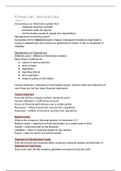College aantekeningen
Financial accounting lecture notes/summary
This 23 page document contains all the lecture notes of the course Financial accounting, complete with theory, formulas and explanations. This summary is perfect for your finals, since it contains all the information.
[Meer zien]





